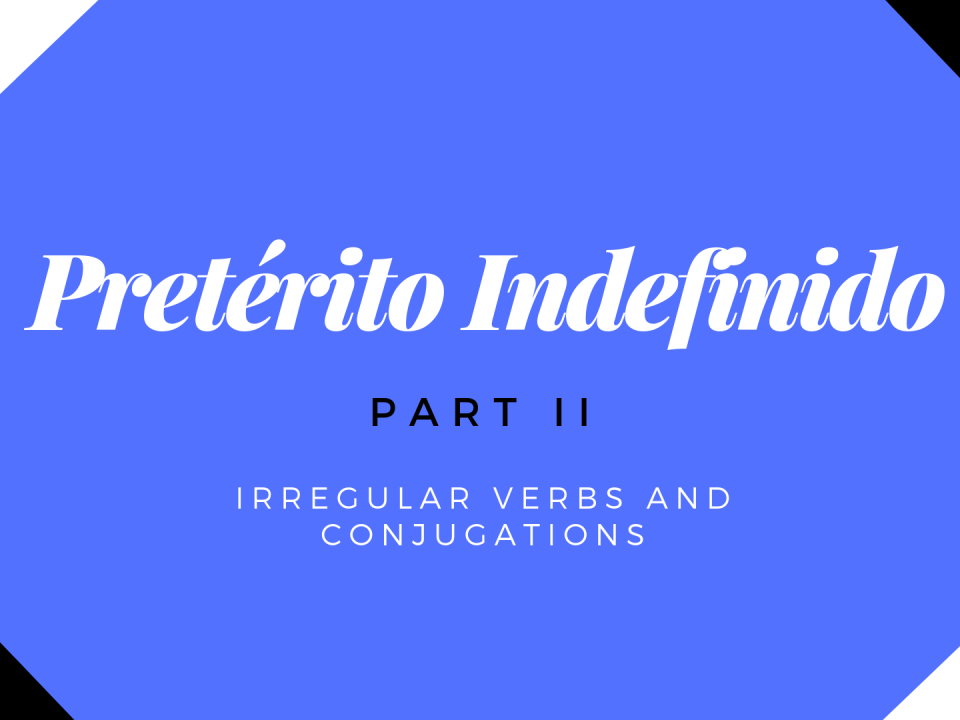The past simple tense, or pretérito indefinido, might just be one of the hardest tenses to learn in Spanish. Not only are there a plethora of irregular verbs and new endings to memorize, but each subject pronoun has its own particular suffix. Let’s not lose hope, though!

There are bounties of websites and apps where you can practice until you get it just right. Here is a breakdown of the irregular past tense verbs as well as the verbs that have irregular conjugations. You can check out this post on pretérito indefinido of regular verbs if you are looking for the beginning basics.
What are the irregular verbs of pretérito indefinido?
Here is a list of irregular verbs in Spanish in the pretérito indefinido that do not follow any particular rules and must simply be memorized. Each conjugation follows yo; tú; él, ella, usted; nosotros, nosotras; vosotros, vosotras; ellos, ellas, ustedes.
ANDAR (to walk or go): anduve, anduviste, anduvo, anduvimos, anduvisteis, anduvieron
CABER (to fit): cupe, cupiste, cupo, cupimos, cupisteis, cupieron
DAR (to give): di, diste, dio, dimos, disteis, dieron
DECIR (to say): dije, dijiste, dijo, dijimos, dijisteis, dijeron
ESTAR (to be): estuve, estuviste, estuvo, estuvimos, estuvisteis, estuvieron
HABER (to have): hube, hubiste, hubo, hubimos, hubisteis, hubieron
HACER (to do or make): hice, hiciste, hizo, hicimos, hicisteis, hicieron
IR (to go): fui, fuiste, fue, fuimos, fuisteis, fueron
OÍR (to hear): oí, oíste, oyó, oímos, oísteis, oyeron
PODER (to be able to): pude, pudiste, pudo, pudimos, pudisteis, pudieron
PONER (to put): puse, pusiste, puso, pusimos, pusisteis, pusieron
QUERER (to want): quise, quisiste, quiso, quisimos, quisisteis, quisieron
SABER (to know): supe, supiste, supo, supimos, supisteis, supieron
SER (to be): fui, fuiste, fue, fuimos, fuisteis, fueron
TENER (to have): tuve, tuviste, tuvo, tuvimos, tuvisteis, tuvieron
TRAER (to bring or take): traje, trajiste, trajo, trajimos, trajisteis, trajeron
VENIR (to come): vine, viniste, vino, vinimos, vinisteis, vinieron
VER (to see): vi, viste, vio, vimos, visteis, vieron
Examples
Mis abuelos tuvieron que dejar su país durante la guerra.
My grandparents had to leave their country during the war
Él anduvo cinco kilómetros para encontrar una gasolinera.
He walked five kilometres to find a gas station.
No traje nada a tu casa.
I didn’t bring anything to your house.
¿Por qué fuisteis al medico ayer?
Why did you (plural) go to the doctor yesterday?
Vimos a nuestra profesora del colegio la semana pasada.
We saw our gradeschool teacher last week.
Verbs that change vowels and consonants in pretérito indefinido
In some cases, vowels have to be changed for both singular and plural third person forms. The other pronouns follow the regular rules.
Stem change – O changes to U
e.g. dormir, morir
Example
dormir (to sleep)
yo dormí, tú dormiste, él/ella/usted durmió, nosotros dormimos, vosotros dormisteis, ellos/ellas/ustedes durmieron
Mi hermano durmió en el garaje porque olvidó sus llaves.
My brother slept in the garage because he forgot his keys.
Stem change – E to I
e.g. advertir, consentir, mentir, medir, pedir, repetir, seguir, servir, sentir, sugerir, preferir, gemir, competir
Example
sentir (to feel)
yo sentí, tú sentiste, él/ella/usted sintió, nosotros sentimos, vosotros sentisteis, ellos/ellas/ustedes sintieron
Ella sugirió que ordenemos comida para llevar.
She suggested we order takeout.
ER/IR changes to Y
e.g. construir, concluir, huir, sustituir, incluir, contribuir, leer
yo incluí, tú incluiste, él/ella/usted incluyó, nosotros incluimos, vosotros incluisteis, ellos/ellas/ustedes incluyeron
Example
Él construyó una pajarera para el jardín.
He built a birdhouse for the garden.
Preserving Pronunciation
In some cases the stem of an -AR verb is changed to keep the pronunciation in the first person singular. This includes verbs like apagar, , buscar, tocar, llegar, averiguar, alcanzar, almorzar, comenzar.
C to QU: buscar -> busqué
G to GU: apagar -> apagué
GU to GÜ: averiguar -> averigüé
Z to C: comenzar -> comencé
Verbs Ending in -UCIR
For verbs such as traducir, conducir, producir, we must change the C to a J. The endings for these verbs are irregular.
conducir (to drive): yo conduje, tú condujiste, él/ella/usted condujo, nosotros condujimos, vosotros condujisteis, ellos/ellas/ustedes condujeron
We hope that this post has helped you get a better understanding of the pretérito indefinido and its many rules and irregulars. If you are still stumped or looking to further your Spanish education, check out our Spanish courses in the heart of Barcelona.
Posted in Learn Spanish
Learn and improve your Spanish in Barcelona, one of the world's most vibrant and exciting cities.
Here at Speakeasy BCN you'll find courses for all abilities and timetables, an incredible team of talented and motivated teachers and classmates to share your interests and passions. And if you need a visa for your stay, then of course we're able to help and advise.

Start your learning Spanish in Barcelona adventure
Let us know if you have any questions about our courses, our school and life at Speakeasy.